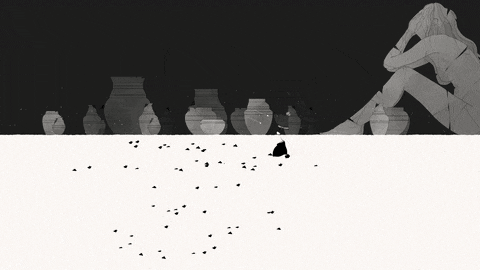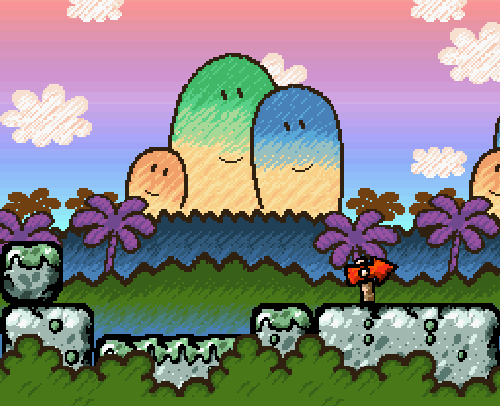I think I don’t like Mario.
There are some things that perhaps have always been around and, for a long time, I simply presumed I knew them, without ever actually paying attention to them. Maybe it’s a medium-close friend. Maybe it’s the entire Star Wars series. Maybe it’s the city I grew up. Maybe it’s Mario.
I don’t really get the charisma of his universe. At the age when my friends were fond of Mario, I was too busy enjoying the comfort of pressing the d-pad to the right and watching Sonic do a million things by himself. And Sonic was cool. Sick, that’s the word. Remembering now, I believe by the time I got a computer to emulate a Nintendo, I was already too old—14 years old. So mature, so dark. So many Japanese cartoons. "Not cartoons, anime!"
"Oh come on, it’s Mario! You’ve never beaten a Mario? Weren’t you a true gamer? Put in a little effort, come on." Said a voice in my head. Okay, I guess it was time to give him a chance. But only if it involves Yoshi, whom I’ve always felt was a nice guy. I also heard some comments before, about Mario’s abusive relationship with him, so I really want people to notice his little smile. A hard-working creature. He even deserved his own game.

Yoshi’s Island is beautiful, right? It looks like crayon, but it’s pixel art. It reminds me of the backgrounds from Ponyo and the light atmosphere of a children’s cartoon, where there are no hats, only boa constrictors digesting elephants. “Children are capable of understanding everything.” Yeah, yeah, alright, maybe I forgot, the title is actually Super Mario World 2: Yoshi’s Island. So of course he had to be there... now with no moustache and in a diaper! He's a baby now, how could I dislike him? Right...?
Well, it was a lovely day when Yoshi was strolling around, until a baby Mario fell like a brick on his back. The stork was transporting a pair of twins when it was attacked and completely lost both. One was taken away, and the other now passes from hand to hand like a hot potato among various Yoshis. He cries a lot, by the way. But the whole island is smiling. In the clouds, flowers, stars. And the music, adventurous, sounds like a sweet march with toy-like tones. The dangers, however, are real. Monsters, cannons, and spikes start appearing, and the innocently drawn backgrounds give way to cold stone blocks and rivers of lava. They face forests, snowstorms, haunted castles, and even the moon, to reunite the brothers and return them to their parents. And the smile remains. Hard-working creature. All the prosperity of the ideal world that Yoshi knew is present through this gesture, against any adversity.
This optimism is refreshing. Life seems simple. Simple as a 1995 Nintendo children’s game could be.

Unfortunately, I never finished it. The truth is I’m bad at platform games, and maybe this one was too long for me. I was enchanted by the aesthetics and surprised by various unusual situations, like those hallucinogenic spores that get Yoshi high on LSD. Carrying a baby! Still, I feel like something’s missing. It’s not about adding more drama or story, but rather cutting content. Something that the design of another time cared little about, when video games were closer to toys. I don’t say this as a demerit, but rather as a matter of inadequacy. While I search for the subjective, there’s a demand for commitment to its most fundamental characteristic of being: a game.
Maybe that aesthetic and story would be equally satisfying to consume just by watching it on YouTube. Probably not. However, mechanics become obstacles when the gameplay isn’t understood as an extension of the narrative. And Yoshi’s Island is pretty good at this, actually, with a lot of love in the details that transport the spirit of that adventure. I just wish its yummy pulp didn’t get diluted amidst so many challenges that sometimes connect me more to its condition as a product than to its artistic expression.
So I went looking for something else to do. Something modern. Something coming "from the arts and not from the toys".

I discovered Gris. Its creative director, Conrad Roset, graduated from the Fine Arts School in Barcelona. With lines and watercolors notably influenced by Egon Schiele, he gained recognition in museums and online, now experimenting with video games as another form of expression.
Yoshi’s smile went to hell. The baby fell into his own mind, where no one can enter and carry him safely. It is in this setting that Gris takes place. Speechless. Not me, but the game. And the protagonist, poor thing. Something happened to her voice, and there’s no text to tell her story or teach her how to play. Released in 2018, it was inspired by the meditative dimension of Journey and by Fumito Ueda, who coined and popularized "Design by Subtraction" through his games—every gameplay convention that doesn’t enhance the themes and sensations of a world or characters should be cut out. From this philosophy, while its predecessors studied ways for player actions to be essential in building emotional ties to characters, Gris uses interaction, intrinsic to video games, to add a new sensory layer to Conrad Roset’s visual repertoire. It’s audiovisual, above all.
Nothing would work properly if the music and animations weren’t up to the paintings. It’s such a perfect marriage, so central to the experience, that player participation is simplified so as not to interrupt its rhythm and fluidity. It’s clever in that sense, as it ends briefly. It feels like a playable short film. It’s just a shame that at crucial moments in the narrative, Gris falters by taking away our power of action and its consequences, exposing the strings that manipulate the player. This breaking of the immersion veil causes noise in the message about fragility and overcoming. These are signs that perhaps reveal how Gris, in its attachment to aesthetic contemplation, fears committing to its most fundamental characteristic of being: a game.

Certainly, there is no universally better or worse way to express oneself. Each work is the product of a specific context and is launched against the particular realities of each player. It is in this exchange that the magic happens, and both sides grow. As long as there are people opening up through this medium, I hope to be there too, open in the search for empathy and self-transformation. I don't know exactly what being "a video game" means. I don't know if these words are capable of handling all the capacity of this medium and art form. But now and then, I'll keep just wanting to press my d-pad to the right, push the jump button and play mindlessly without finish anything. And that’s okay when it’s “just that".

Last edited:
